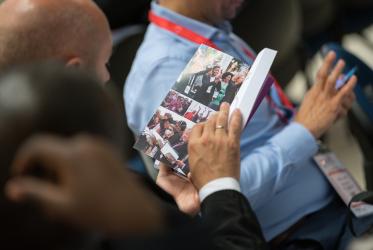We Are Church, Journeying toward Justice
by Dr Agnes Abuom, moderator of the Central Committee of the World Council of Churches
Good morning, sisters and brothers in Jesus Christ. We bring you greetings and a message of congratulations from the World Council of Churches general secretary, Rev. Dr Olav Fykse Tveit, on your fifteenth ELCA Churchwide Assembly. As you celebrate a number of milestones at this assembly, he also wishes you God’s blessings as you act upon “A Declaration of Inter-Religious Commitment: A Policy Statement of the ELCA.”
It is an honour to be here with you at your churchwide assembly, in my capacity as the moderator of the World Council of Churches, and to reflect with you as you publicly endorse the WCC Thursdays in Black campaign once again.
As you may be aware, I am Kenyan. I have worked for some time in my own country and across Africa to address violence, poverty, injustice and promote equality and God’s love for all people. All matters of justice, peace and faith connect us to the world, and as WCC moderator I see so many of the same problems and challenges reflected across many churches and countries.
The decision of the Evangelical Lutheran Church in America to endorse Thursdays in Black is timely. For the signs of the times around us indicate that here in North America and beyond, the world is in crisis. Since Monday, you have been reflecting and identifying practical responses to some of these closely related signs, including these three disturbing phenomena:
1. Xenophobia, racism, and populist nationalism: As we meet here, xenophobia, racism and populist nationalism gain momentum every day, and like a bushfire, they have become widespread. Xenophobia has caused division, claimed lives, and is a threat to peace and security in many spaces. And far too often, the first impacted are women, children, and the weak, such as the elderly and the disabled. In denying rights of the stranger and in refusing to welcome the stranger, we run the risk of ignoring the hungry, naked, and imprisoned.
When politics is used to justify or ignore acts of racism and xenophobia, we know that it is time for action. Aware that historically the church has spoken against this issue, the church cannot and must not keep silent. Rather, now is the time for the church to revamp its actions against xenophobia, racism, and populist nationalism.
2. War and its impact on survivors: With the increase in militarization and with installation of peace-keeping and security forces globally, there is also an increase in sexual and gender-based violence in such spaces. The reports of the UN High Commissioner for Refugees indicate that rape is not only a weapon of war. Also in post-war spaces, rape, forced marriages, trafficking in persons, as well as susceptibility to malnutrition and diseases are increasing as a result of scarce resources and threats to security. This affects all impacted by the war: men, women and children. It is unfortunate that rape is now being normalized as part of the whole culture of war, which is a development that we must resist in every way.
I have encountered some survivors in my work with the churches in Africa and the rest of the world. And it is clear that the oppressed and the victimized who have been silenced are relying on us to tell their stories and to speak out. Sisters and brothers, this is the season for action.
3. Sexual and gender-based violence (SGBV): One of the most pressing and most urgent problems that require our concerted efforts is sexual and gender-based violence (SGBV). It has become a severe pandemic to which the church must continue to respond. SGBV occurs in times of war and peace, in the public and private arenas, at home, in the workplace, at schools, and even in our churches. Perpetrators include strangers, family members, and friends; persons of prominent social standing as well as the ordinary civilian; men and women; the young and old.
In my home country, Kenya, SGBV has escalated to the point where cases of murder-suicides are no longer exceptional news items. But this is not only a Kenyan problem: murder-suicides (whether in domestic disputes or school shootings) have become part of the new global narrative, at an alarming rate that calls for counselling and trauma services to be an essential part of the church’s pastoral ministry today.
What is to be done?
The time has come, and now is, for us as the church to reclaim our prophetic role in speaking truth to power on behalf of the victimized and vulnerable. The World Council of Churches is committed to drawing attention to the problems and to creating awareness through our programmatic work across the secretariat and through the work and witness of member churches like you.
At the WCC, we have taken a multipronged, intersectional approach to addressing issues related to sexual and gender-based violence – from women’s pilgrim team visits in conflicted countries, to work on Positive Masculinities; from contextual Bible studies to developing a gender justice policy; from denouncing sexual and gender-based violence to supporting policies that accompany perpetrators to reduce recurrence.
Of course, ours is a work in progress, and not all our membership is at the same place. Thus we salute the commitment to preserving human dignity and justice, evidenced in your own programmes and policies.
And yet, far too often, it seems as if the church is silent. Many others have been overcome by their own fears and failings, contributing to the complicity and the complexity that result in sexual and gender-based violence.Through their (in) action, the global church has failed.We have failed to speak up, and speak out against the demons of xenophobia, racism, populist nationalism; war and sexism which give rise to increased incidents of injustice. We have failed to speak truth to power, denying our prophetic call to bring Good News to the poor, proclaim release of the captive and liberation for the oppressed. We have failed when we use scripture, tradition, and theology to perpetuate the myth that it is okay for us to repress, silence, or deny the existence of structures that continue to oppress and belittle women
But there is hope. For here in the ELCA is the living testimony that a remnant exists which offers hope to the despairing and which lives the principles of justice and peace. If we are known by our fruits, then your programmes and publications are the fruits by which the ELCA shall be known – as the church which dares to side with the oppressed, based on a revisiting of scripture, traditions and theology of your forebears.
In 2017, the ELCA and the WCC gathered at a similar assembly of the Lutheran World Federation on a Thursday - with soon-to-be Nobel Peace Prize winner, Denis Mukwege Mukengere, that day’s keynote speaker - boldly proclaiming our resistance to any form of violence against women. Today, we stand together once again, wearing Black to reiterate that the voices of the oppressed will not be silenced. This and every Thursday we join with thousands of others who dare to be counted as part of the global church’s move to resist all forms of sexual and gender-based violence. Indeed Thursdays in Black is a movement that invites men and women, boys and girls to join as pilgrims of a world free of rape, free of gender-based violence, and in pursuit of a society, church, and family marked by justice and peace. As pilgrims against SGBV, we are like street lights that light up the path and make companionship along the way worthwhile. As anti-SGBV pilgrims ours is the Reclamation of the Good News of Our Lord Jesus for the future.
Later today, we concretize our commitment with a photo will be posted on social media to remind the world, that this church – the Evangelical Lutheran Church in America – dares to say no to gender-based violence against women, children, and sexual minorities. It is my prayer that we leave this assembly with a deeper commitment to justice and with our own action plan for denouncing SGBV in our contexts. We as people of faith, should be the last people to accept things as they are!
And finally, as I thank you once again for this opportunity to share with you, I dare to suggest, that the Spirit of the Lord is here; may our actions be a visible fulfilment of the scriptures. Sisters and brothers all, God bless you!





